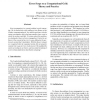1616 search results - page 87 / 324 » Robust game theory |
WSC
2008
13 years 11 months ago
2008
In this paper we present the use of "what-if"-analysis in simulation games for spatial decision making by introducing the concept of multiple worlds. We expect that &quo...
ATAL
2010
Springer
13 years 10 months ago
2010
Springer
Multi-agent learning is a crucial method to control or find solutions for systems, in which more than one entity needs to be adaptive. In today's interconnected world, such s...
ATAL
2003
Springer
14 years 20 days ago
2003
Springer
What distinguishes e-commerce from ordinary commerce? What distinguishes it from distributed computation? In this paper we propose a performative theory of e-commerce, drawing on ...
USAB
2008
13 years 10 months ago
2008
In this paper, we describe a conceptual framework and address the related issues and solutions in the identification of three major challenges for the development and evaluation of...
HPDC
2002
IEEE
14 years 1 months ago
2002
IEEE
Error propagation is a central problem in grid computing. We re-learned this while adding a Java feature to the Condor computational grid. Our initial experience with the system w...

